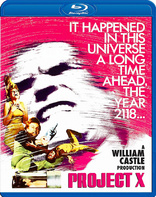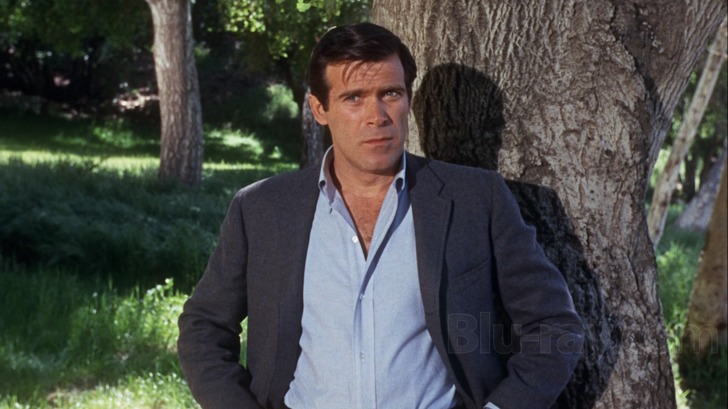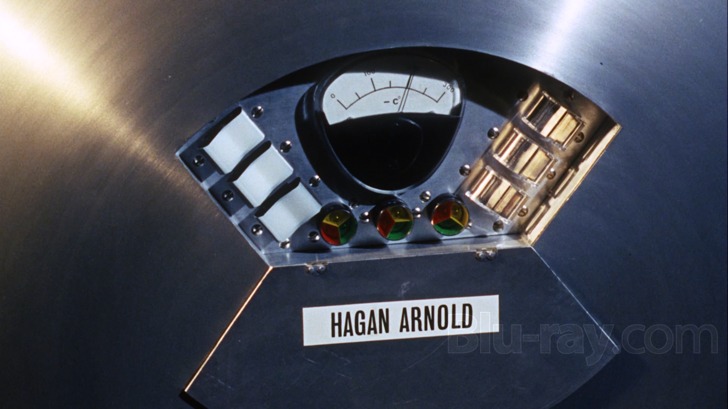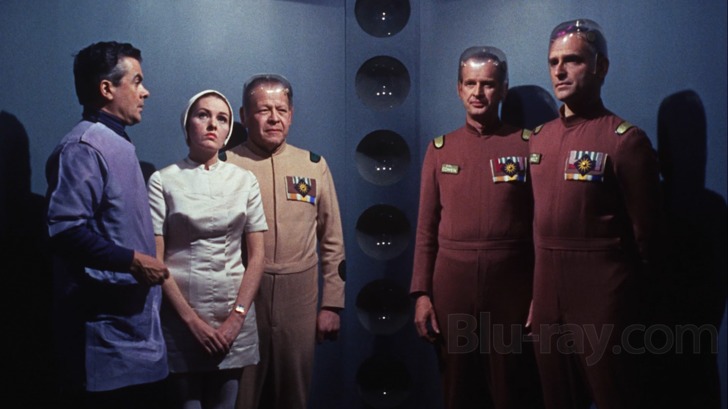Project X Blu-ray Movie
HomeProject X Blu-ray Movie 
Olive Films | 1968 | 97 min | Not rated | Jun 19, 2012
Movie rating
6.4 | / 10 |
Blu-ray rating
| Users | 0.0 | |
| Reviewer | 3.5 | |
| Overall | 3.5 |
Overview
Project X (1968)
A spy is brought back from cryogenic suspension after being almost killed in a plane crash returning from a mission to learn about a deadly new weapon being developed in the East. But the vital memories are being suppressed, so the authorities use ultra-advanced technologies to try to uncover the secret.
Starring: Christopher George, Greta Baldwin, Henry Jones (I), Monte Markham, Harold GouldDirector: William Castle
| Sci-Fi | Uncertain |
| Mystery | Uncertain |
Specifications
Video
Video codec: MPEG-4 AVC
Video resolution: 1080p
Aspect ratio: 1.78:1
Original aspect ratio: 1.85:1
Audio
English: DTS-HD Master Audio Mono
Subtitles
None
Discs
25GB Blu-ray Disc
Single disc (1 BD)
Playback
Region A, B (C untested)
Review
Rating summary
| Movie | 3.0 | |
| Video | 4.0 | |
| Audio | 3.5 | |
| Extras | 0.0 | |
| Overall | 3.5 |
Project X Blu-ray Movie Review
No, not that one. Or that other one.
Reviewed by Jeffrey Kauffman May 30, 2012Spring 2012 greeted a boisterous box office hit with Project X, a Hangover wannabe that kept its
generic placeholder title when it started creating buzz, buzz that couldn't overcome the film's rather blistering critical
reaction (not that it much mattered in terms of receipts). A generation earlier, there was another Project X, a
1987 science fiction thriller starring Matthew Broderick and a young Helen Hunt that dealt with super intelligent
monkeys. A generation before that there was a little remembered William Castle production called Project
X, another science fiction-esque thriller that recasts a sort of quasi-James Bond plotline with elements of mind
control (shades of The Ipcress File, another Bond-esque spy thriller) and some sociopolitical ideas that were
beginning to make headway in the late sixties.
This particular Project X has long been a fascination for this reviewer, for
as a child I bought a little paperback book called The Artificial Man by L.P. Davies simply because the cover
looked "really cool". I was instantly swept up into a compelling story where a man wakes up in his little English village,
walks downstairs to get breakfast and has a brief, terrifying moment where he can't remember which way to turn to get
to the kitchen when he gets to the bottom of the stairs. It's his first clue that not everything is as it seems, and he
slowly begins to become aware that he is in fact some kind of pawn in a rather complex scheme that may involve the
highest reaches of the British government.
The hero of The Artificial Man is supposedly an author and he is
working on a novel about a spy--until he starts to realize that what he's writing about may in fact be actual memories
of his
own "real" life. The book was a bit confusing for a child of my age and I remember passing it off on my eldest sister to
see what she thought of it (especially the somewhat confusing, ambivalent ending), and against some considerable
odds, The Artificial Man intrigued her as much as it had me. Years after this childhood reading adventure I
became aware that the book had been adapted into the William Castle film Project X, albeit evidently with major
changes (what else is new?). In years of trying to track it down (in the pre-cable and pre-internet days), it always
seemed to elude "capture". But here it finally is, as one of the ongoing slate of Paramount catalog titles that Olive Films
has been licensing and releasing on Blu-ray.

William Castle was still a bit less than a year away from what would inarguably be the high water mark of his long career-- producing the legendary Roman Polanski film adaptation of Ira Levin's iconic chiller Rosemary's Baby-- when he both produced and directed Project X in 1967 (the film received a late spring - early summer 1968 release, in fact barely a month before Rosemary's Baby premiered). Though Project X has none of Rosemary's Baby's cachet (for good reason), it was by Castle standards a fairly high budget affair, with some appealing (if now patently goofy looking) production design and a lead performance by Christopher George, who was then enjoying his first major burst of popularity as the star of ABC's The Rat Patrol. But Project X is a cautionary tale in what can go wrong in adapting a book--even a not very well known book--for the screen.
As indicated above, one of the central conceits of L. (Leslie) P. Davies' source novel is that the reader is along for the ride as Alan Fraser, ostensible writer of spy thrillers in a 1960's English village, slowly begins to realize that he's really the spy he's writing about, and that indeed his actual time frame is not what he thinks it is. Davies' book is a brilliantly crafted piece of misdirection and when the truth finally becomes evident, the reader is as surprised as Fraser. In the film version, screenwriter Edmund Morris, who built the bulk of his career on television series (including The Rat Patrol), spills the beans right up front, giving us a long and at times ludicrously hilarious prelude where a top secret future world cryogenics lab is "thawing" out super spy Hagan Arnold in order to retrieve some erased memory about an impending disaster facing the West. This is a fatally flawed approach that completely twists the story on its head and makes the audience a co-conspirator with the future world's spies and bureaucrats, rather than an unwitting and unknowing ally of Hagan Arnold. Morris also unwisely jettisons the spy thriller author angle, instead making the "pretend" world one where "Alan Fraser" is a bank robber on the lam.
What's so fascinating about this wrong headed approach is how brilliantly Project X could have prefigured one of the most iconic films of the past several decades if only it had hewed closer to Davies' source novel. That film is The Matrix, another movie which plays mind games on the viewer as well as its hero as he (and we) attempt to figure out exactly what is real and what isn't. What's especially fascinating in this regard is that the term "matrix" is used repeatedly in Project X for the "memory implantation" technique which makes Arnold think he's a thief living in the 1960's. Could the Wachowski Brothers have perhaps seen Project X on some late night movie broadcast and been inspired by it to create a film based upon a man who isn't who he thinks he is and whose supposed reality is, well, unreal?
Still, there's a certain kitsch factor with Project X that makes it goofily enjoyable on its own terms (part of that kitsch factor includes some animated sequences by none other than Hanna-Barbera). The opening "future world" segment is undeniably hilarious, especially with regard to the outré plastic headgear members of the Intelligence forces wear (how intelligent could they be to don something so silly looking?). And lovers of a certain iconic sixties television space drama will laugh out loud at one of the sound effects obviously culled from the Paramount effects library (I won't spoil it for you, but rest assured you will recognize it instantly). The film also boasts a nice turn from the vastly underappreciated Henry Jones, an actor whose name you may not recognize but whose face and voice will strike a chord once he's seen and heard from countless film and television performances. Here as the doctor trying to cull memories from Arnold's mind, he's weirdly smarmy but enjoyable and he actually carries the film more than putative star George.
The Artificial Man deserves a better adaptation than Project X (as do a number of other Davies' novels, several of which are rather prescient in their use of mind control and alternate realities). But there's still a kernel of excitement left in this film, albeit a kernel clad in some fairly standard writing and filmmaking. This is certainly one film where even if you haven't read it, you're almost certain the book was better.
Project X Blu-ray Movie, Video Quality 

Project X is presented on Blu-ray courtesy of Olive Films with an AVC encoded 1080p transfer in 1.78:1. This is
undeniably one of the nicest looking Paramount catalog releases licensed by Olive yet to appear on Blu-ray, at least for the
most part. The elements here are in mostly superior shape (more about a few niggling qualms in a moment),
something that might be due to the fact that Project X had a very brief theatrical shelf life and hasn't even
been broadcast very much in the decades since its short theatrical run. The image here is wonderfully sharp and colors are
very bold and extremely well saturated. As with most of these HD masters provided to Olive by Paramount, there once
again does not appear to have been even slight digital tweaking, and so the image is very film like, with natural grain, but
also with (very) occasional specks and other slight damage. What is occasionally odd about this transfer are some very
shoddy looking cutaways in certain scenes, brief shots that almost look like they were sourced from a print rather than an
interpositive, and perhaps even a 16mm print at that (see screencap 7 for a good example of this anomaly). Note for
example some of the two shots featuring Jones at around
the 10 minute mark when the "future" consortium is deciding how to handle Arnold's thawing and memory implantation.
While the bulk of this scene is very sharp and boasts excellent fine detail, there are a number of coverage shots that are
really soft (almost to the point of being out of focus) and ragged looking. Having never seen Project X
theatrically, I can't state definitively whether or not these anomalies have always been present, but they stand out like a
sore thumb simply because the bulk of this Blu-ray looks so good.
Project X Blu-ray Movie, Audio Quality 

Project X features the same lossless DTS-HD Master Audio Mono mix that has graced a lot of the recent glut of Paramount catalog releases from Olive. The soundtrack here is rather good sounding, albeit obviously narrow. It's too bad we don't have at least a stereo track to enjoy Van Cleave's bizarre but fun score, which has the composer working in a sort of Lalo Schifrin territory, with Mannix jazz waltzes mixed in with some more bizarre nascent electronic elements (replete with special credit for the Lowrey Organ). Dialogue is crisp and clean and the sound effectsâ€"including the one you're certain to recognizeâ€"are delivered with excellent fidelity. While there's not a lot to get too worked up about with regard to this mix, there's also nothing major to complain about either.
Project X Blu-ray Movie, Special Features and Extras 

This is yet another Olive Films release with no supplements of any kind.
Project X Blu-ray Movie, Overall Score and Recommendation 

Project X is one of those late sixties kitsch-fests that is wackily enjoyable on its own small scale terms. The problem is the film could have been so much better if only it had stuck closer to Davies' original concept. I highly recommend any of you who like trippy science fiction-esque novels to seek out The Artificial Man (especially the Scholastic paperback edition, which has a "really cool" cover) and to read it, either before or after seeing Project X. As for the film itself, it's definitely a mixed bag, albeit one I'm prone to like simply because I've wanted to see it for so long. Despite the problems with the film itself, this Blu-ray is easily one of the nicest Paramount catalog releases we've yet seen from Olive Films, and that groovy Van Cleave score makes the audio enjoyable as well. With caveats noted, Project X comes Recommended.
Similar titles
Similar titles you might also like

World on a Wire
Welt am Draht
1973

Kill Switch
2017

Thunderbirds Are Go
KL Studio Classics
1966

Who?
Robo Man
1974

Sky Pirates
1986

Wild Palms
1993

Footprints
Primal Impulse / Le orme
1975

Gammera 3D
High Frame Rate Edition
1966

Ashfall
백두산
2019

Demonlover
2002

Narcopolis
2015

Raiders of Atlantis
Atlantis Interceptors / I predatori di Atlantide
1983

The Terror Beneath the Sea
1966

Aniara
2018

The Silence
1998

Warning from Space
Uchūjin Tokyo ni arawaru
1956

Fahrenheit 451
2018

Inferno 4K
2016

Johnny Mnemonic: In Black and White
1995

The 39 Steps
1935